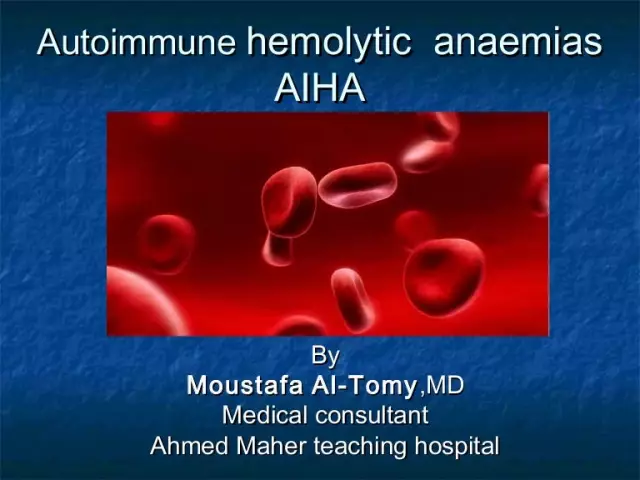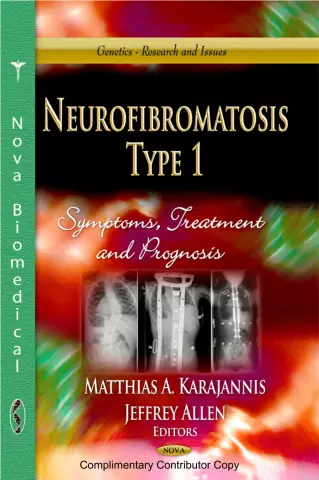- Author Rachel Wainwright wainwright@abchealthonline.com.
- Public 2023-12-15 07:39.
- Last modified 2025-11-02 20:14.
Autoimmune thyroiditis
The content of the article:
- Causes and risk factors
- Forms of the disease
- Disease stages
- Symptoms
- Diagnostics
- Treatment
- Possible complications and consequences
- Forecast
Autoimmune thyroiditis is a concept that unites a heterogeneous group of inflammatory diseases of the thyroid gland, developing as a result of immune auto-aggression and manifested by destructive changes in the tissue of the gland of varying severity.
Despite its widespread occurrence, the problem of autoimmune thyroiditis has been little studied, which is associated with the absence of specific clinical manifestations that allow detecting the disease at early stages. Often, for a long time (sometimes the whole life), patients do not know that they are carriers of the disease.

Autoimmune thyroiditis includes a group of inflammatory diseases of the thyroid gland
The frequency of occurrence of the disease, according to various sources, varies from 1 to 4%, in the structure of thyroid pathology, its autoimmune damage accounts for every 5-6th case. Women are exposed to autoimmune thyroiditis much more often (4-15 times). The average age at which a detailed clinical picture appears, indicated in the sources, varies considerably: according to some data, it is 40-50 years, according to others - 60 and older, some authors indicate the age of 25-35 years. It is reliably known that the disease is extremely rare in children, in 0.1-1% of cases.
Causes and risk factors
The main cause of the disease is a malfunction of the immune system, when it recognizes the cells of the thyroid gland as foreign and begins to produce antibodies (autoantibodies) against them.
The disease develops against the background of a genetically programmed defect in the immune response, which leads to the aggression of T-lymphocytes against their own cells (thyrocytes) with their subsequent destruction. This theory is supported by a clearly traceable trend towards diagnostics in patients with autoimmune thyroiditis or their genetic relatives of other immune diseases: chronic autoimmune hepatitis, type I diabetes mellitus, pernicious anemia, rheumatoid arthritis, etc.
Autoimmune thyroiditis often manifests itself in members of the same family (in half of the patients, the closest relatives are also carriers of antibodies to thyroid cells), in this case, the genetic analysis reveals the HLA-DR3, DR4, DR5, R8 haplotypes.
Risk factors that can provoke a breakdown in immune tolerance:
- excess intake of iodine;
- exposure to ionizing radiation;
- taking interferons;
- transferred viral or bacterial infections;
- unfavorable ecological situation;
- concomitant allergic pathology;
- exposure to chemicals, toxins, prohibited substances;
- chronic stress or acute excessive psycho-emotional stress;
- injury or surgery on the thyroid gland.

Autoimmune thyroiditis develops when antibodies recognize thyroid cells as foreign
Forms of the disease
There are 4 main forms of the disease:
- Chronic autoimmune thyroiditis, or Hashimoto's thyroiditis (disease), or lymphocytic thyroiditis.
- Postpartum thyroiditis.
- Painless thyroiditis, or "silent" ("mute") thyroiditis.
- Cytokine-induced thyroiditis.
Chronic autoimmune thyroiditis also has several clinical forms:
- hypertrophic, in which the gland is enlarged to varying degrees;
- atrophic, accompanied by a sharp decrease in the volume of the thyroid gland;
- focal (focal);
- latent, characterized by the absence of changes in the tissues of the gland.
Disease stages
During chronic autoimmune thyroiditis, there are 3 successive phases:
- Euthyroid phase. There are no thyroid dysfunctions, the duration is several years.
- The phase of subclinical hypothyroidism is the progressive destruction of gland cells, compensated by the tension of its functions. There are no clinical manifestations, the duration is individual (possibly lifelong).
- The phase of overt hypothyroidism is a clinically pronounced decrease in gland function.
In postpartum, mute and cytokine-induced thyroiditis, the phasing of the autoimmune process is somewhat different:
I. Thyrotoxic phase - massive release of thyroid hormones into the systemic circulation from cells destroyed during an autoimmune attack.

Thyrotoxic phase of autoimmune thyroiditis - thyrotoxicosis
II. The hypothyroid phase is a decrease in the level of thyroid hormones in the blood against the background of massive immune damage to the gland cells (as a rule, it lasts no more than a year, in rare cases - for life).

Hypothyroid phase of autoimmune thyroiditis - hypothyroidism
III. Thyroid function recovery phase.
A monophasic process is rarely observed, the course of which is characterized by stuck in one of the phases: toxic or hypothyroid.
Due to the acute onset caused by massive destruction of thyrocytes, postpartum, dumb and cytokine-induced forms are combined into the group of so-called destructive autoimmune thyroiditis.
Symptoms
The manifestations of various forms of the disease have some characteristic features.
Since the pathological significance of chronic autoimmune thyroiditis for the body is practically limited to hypothyroidism developing at the final stage, neither the euthyroid phase, nor the phase of subclinical hypothyroidism have clinical manifestations.
The clinical picture of chronic thyroiditis is formed, in fact, by the following polysystemic manifestations of hypothyroidism (suppression of the functions of the thyroid gland):
- lethargy, drowsiness;
- feeling unmotivated fatigue;
- intolerance to the usual physical activity;
- slowing down reactions to external stimuli;
- depressive conditions;
- decreased memory and concentration;
- "Myxedema" appearance (puffiness of the face, puffiness of the area around the eyes, pallor of the skin with an icteric tinge, weakening of facial expressions);
- dullness and fragility of hair, increased hair loss;
- dry skin;
- a tendency to increase body weight;
- chilliness of the limbs;
- decrease in heart rate;
- decreased appetite;
- a tendency to constipation;
- decreased libido;
- violation of menstrual function in women (from intermenstrual uterine bleeding to complete amenorrhea).
The unifying feature for postpartum, silent and cytokine-induced thyroiditis is a sequential change in the stages of the inflammatory process.
Symptoms typical for the thyrotoxic phase:
- fatigue, general weakness, alternating with episodes of increased activity;
- weight loss;
- emotional lability (tearfulness, sudden mood swings);
- tachycardia, increased blood pressure (blood pressure);
- feeling hot, hot flashes, sweating;
- intolerance to stuffy rooms;
- tremor of the limbs, trembling of the fingers;
- impaired concentration, memory impairment;
- decreased libido;
- violation of menstrual function in women (from intermenstrual uterine bleeding to complete amenorrhea).
The manifestations of the hypothyroid phase are similar to those of chronic autoimmune thyroiditis.
A characteristic sign of postpartum thyroiditis is the onset of thyrotoxicosis symptoms by the 14th week, the appearance of signs of hypothyroidism by the 19th or 20th week after birth.
Painless and cytokine-induced thyroiditis, as a rule, does not show a violent clinical picture, manifesting itself with symptoms of moderate severity, or asymptomatic and are detected during a routine examination of the level of thyroid hormones.
Diagnostics
Diagnosis of autoimmune thyroiditis involves a number of laboratory and instrumental studies to confirm the fact of auto-aggression of the immune system:
- determination of antibodies to thyroid peroxidase (AT-TPO) in the blood (an increased level is established);
- determination of the concentration of T3 (triiodothyronine) and free T4 (thyroxine) in the blood (an increase is detected);
- determination of the level of thyroid-stimulating hormone (TSH) in the blood (with hyperthyroidism - a decrease against the background of an increase in T3 and T4, with hypothyroidism - the opposite ratio, a lot of TSH, little T3 and T4);
- Ultrasound of the thyroid gland (hypoechogenicity is detected);
- determination of clinical signs of primary hypothyroidism.
The diagnosis of "chronic autoimmune thyroiditis" is considered legitimate when a combination of changes in the level of microsomal antibodies, TSH and thyroid hormones in the blood with a characteristic ultrasound picture. In the presence of specific symptoms of the disease and an increase in the level of antibodies in the absence of changes in ultrasound or instrumentally confirmed changes in the thyroid tissue with a normal level of AT-TPO, the diagnosis is considered probable.

Thyroid ultrasound
For the diagnosis of destructive thyroiditis, it is extremely important to link with previous pregnancy, childbirth or abortion and taking interferons.
Treatment
There is no specific treatment for autoimmune inflammation of the thyroid gland, symptomatic therapy is performed.
With the development of hypothyroidism (both in chronic and destructive thyroiditis), replacement therapy with thyroid hormone preparations based on levothyroxine is indicated.
In case of thyrotoxicosis against the background of destructive thyroiditis, the appointment of antithyroid drugs (thyrostatics) is not indicated, since there is no hyperfunction of the thyroid gland. Treatment is carried out symptomatically, often with beta-blockers for severe cardiac complaints in order to reduce the heart rate and blood pressure.
Surgical removal of the thyroid gland is indicated only with a rapidly growing goiter, compressing the airways or vessels of the neck.

Fast-growing goiter - an indication for complete removal of the thyroid gland
Possible complications and consequences
Complications of autoimmune processes in the thyroid gland are not common. The main consequence is the development of persistent overt hypothyroidism, the pharmacological correction of which does not cause significant difficulties.
Forecast
Carriage of AT-TPO (both asymptomatic and accompanied by clinical manifestations) is a risk factor for the development of persistent hypothyroidism (suppression of thyroid function) in the future.
The likelihood of developing hypothyroidism in women with an increased level of antibodies to thyroid peroxidase against the background of an unchanged level of thyroid-stimulating hormone is 2% per year. In the presence of an elevated level of AT-TPO and laboratory signs of subclinical hypothyroidism, the probability of its transformation into overt hypothyroidism is 4.5% per year.
Postpartum thyroiditis can degenerate into a chronic autoimmune (with a further outcome in overt hypothyroidism) in 20-30% of women.
YouTube video related to the article:

Olesya Smolnyakova Therapy, clinical pharmacology and pharmacotherapy About the author
Education: higher, 2004 (GOU VPO "Kursk State Medical University"), specialty "General Medicine", qualification "Doctor". 2008-2012 - Postgraduate student of the Department of Clinical Pharmacology, KSMU, Candidate of Medical Sciences (2013, specialty "Pharmacology, Clinical Pharmacology"). 2014-2015 - professional retraining, specialty "Management in education", FSBEI HPE "KSU".
The information is generalized and provided for informational purposes only. At the first sign of illness, see your doctor. Self-medication is hazardous to health!






